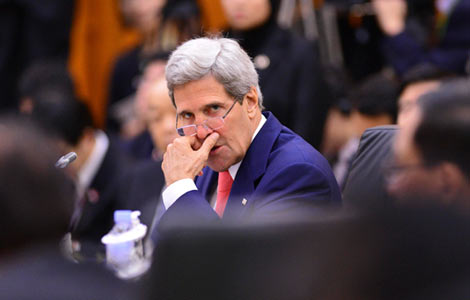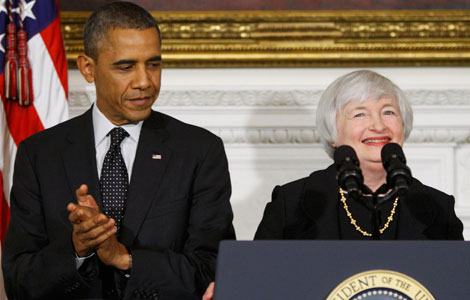New window for foreign firms
Updated: 2013-10-11 07:46
By Shi Jing and He Wei in Shanghai (China Daily)
|
||||||||
Germany-based Schaeffler Technologies AG & Co, a major manufacturer of bearings, also sees the FTZ as an important part of China's market liberalization.
Just two days before the FTZ opened, Saint-Gobain SA, a French company that makes high-performance materials for the construction industry, inaugurated the second phase of its research and development center in Shanghai. It said it is still evaluating the potential opportunities the FTZ may offer.
"For Saint-Gobain, China is not only a huge market but also a key place for innovation and invention. Our firm commitment to the Chinese market, and to Chinese society, has been further encouraged by the FTZ, and more widely by the engagement of the Chinese authorities with further reforms," said Javier Gimeno, chief executive officer of Saint-Gobain Asia-Pacific.
Praxair China, which deals with industrial gases, hopes to land as customers some of the high-tech enterprises and high value-added manufacturing companies that will either set up in, or relocate to, the trade zone. These could be drawn from such industries as high-end machinery, integrated circuits, new energy automobiles and biopharmaceuticals, according to Praxair President Minda Ho.
"The zone's more flexible and open financial policies and conditions will make it smoother and more efficient to import components [for some of our] products, such as helium," he added.
"Looking ahead, if China rolls out more free-trade testing zones, the State Administration of Foreign Exchange would be likely to further liberalize its policy on the convertibility of the Chinese yuan. This would make life dramatically easier for foreign-invested companies in terms of cash management."
Overseas authorities have also responded well to the new FTZ. After studying its new policies, Kenneth Jarrett, president of the American Chamber of Commerce in Shanghai, listed some of the benefits.
"There are growing indications that investors don't have to have approval to set up a business. Instead they can just go ahead and register. So that would simplify things for foreign companies," said Jarrett.
"The second element is the strong emphasis on the services sector. It will break down barriers for foreign companies in this area to be active. So here you have references to travel agencies, et cetera," he said.
"Take the consultancy industry, for example. The more foreign companies operate here, the more opportunities there are for these supporting companies to have additional businesses. With the introduction of any kind of new regulation, there tends to be a lot of confusion about what you can do and can't do. That provides an opportunity for consultancies."
While concern has been expressed about whether the FTZ poses a direct threat to Hong Kong, Jacky Chung, regional director of the Hong Kong Trade Development Council Eastern and Central China, said the relationship between the two will be mutually beneficial.
"The FTZ will make it easier for Hong Kong companies to enter the mainland, and vice versa," he said. "It will bring more benefits, enhance productivity and demonstrate the 'dividend of reform', which is also beneficial to the economic development of Hong Kong."
Contact the writers at shijing@chinadaily.com.cn and hewei@chinadaily.com.cn.
Most Viewed
Editor's Picks

|

|

|

|

|

|
Today's Top News
China calls for social reconciliation in Egypt
Obama 'likely' to sign debt extention bill
Kerry says US will work to end fiscal crisis
Asian 'safety net' stressed
90% US firms make profits in China
Currency swap signed a 'landmark'
Libyan PM released
Trending news across China
US Weekly

|

|















